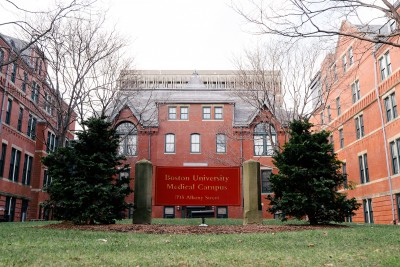
Boston University trustee Richard Shipley, a School of Management Class of 1972 graduate, donated $10.5 million to the BU School of Medicine for the creation of the Shipley Prostate Cancer Research Center on the BU Medical Campus, BU spokesperson Colin Riley said.
Riley confirmed that Shipley’s donation will go toward finding treatments for prostate cancer that are less invasive, less aggressive and would lead to a more permanent recovery. Along with the research center, a website will be created to inform male patients of treatment options.
Riley said that Shipley’s donation will undoubtedly improve lives for those diagnosed with prostate cancer. The donation will also go toward finding more dynamic and personalized treatments.
“It was a very generous gift on Richard Shipley’s part,” Riley said. “I’m sure it will help many men in the future.”
Shipley was diagnosed with prostate cancer 18 months ago and envisions the research center to further exploration on “humane, high-tech treatments” for men, according to a BU Today article.
BUSM Dean Karen Antman wrote in an email that the center aims to explore research of more dynamic cancer treatments.
“The research center will initially focus on personalized medicine, finding genomic approaches to better determine treatment options based on the aggressiveness of the cancer, thereby providing more aggressive treatments only for aggressive tumors,” Antman wrote.
The Shipley Foundation’s donation will be used for research and awareness, Antman noted. The gift will also support a patient-centered website that lays out treatment options “written in plain English” so men can have a better and holistic understanding of their choices.
“Center funds in the future would be available for the most promising proposals,” Antman wrote. “We can’t predict what will be the best research for the next 15 years.”
Antman stated that the Shipley Prostate Cancer Research Center would provide opportunities for BU students to become more involved in research opportunities.
“Medical and graduate students can certainly elect to do their research in the Shipley Prostate Cancer Research Laboratories or can get involved in any center clinical trials or education initiatives,” Antman wrote.
Antman also wrote that she advocates for more publicity of prostate cancer, and she expressed enthusiasm for a website that can inform those diagnosed.
“Prostate cancer is the most common malignancy among American men,” Antman wrote. “Patients’ many possible treatment options are complicated. A well designed and up to date web site that explains treatment options in easy to understand language, videos and pictures would allow patients globally to make more informed treatment decisions.”
According to the National Cancer Institute Surveillance, Epidemiology, and End Results Program, there was an estimate of 180,890 men diagnosed with prostate cancer in 2016. The data also stated that in 2013, there were an estimated 2,850,139 men living with prostate cancer in the United States.
Several students said Shipley’s donation could positively affect BU’s reputation and research opportunities.
Nicole Menkel, a junior in the College of Communication, said Shipley’s generous donation could really make a difference in prostate cancer research.
“It would definitely help our reputation and supply way more opportunities to do research and even encourage other people to donate funds,” she said. “That … could do a lot of wonders in research.”
Kathleen Coleman, a junior in the Sargent College of Health and Rehabilitation Sciences, said she is glad Shipley decided to donate to his alma mater.
“Obviously, with someone who has the means of giving such a great donation, that’s awesome because that does make new opportunities for a lot of new research,” she said. “It is great that he chose BU, because I think BU School of Medicine is a great place to do that research at.”
John Czubek, a freshman in CAS, said this donation, along with recent BU projects, will improve the university’s reputation.
“It’s great,” he said. “The new neuroscience building being constructed is already a step in that direction, and this further investment will put us on the map on an even more prominent scale.”












































































































